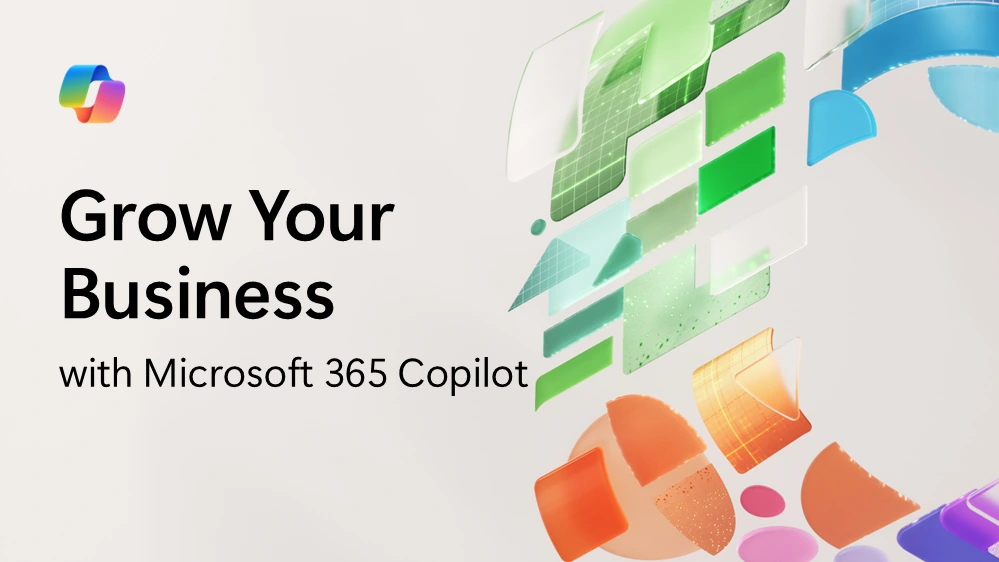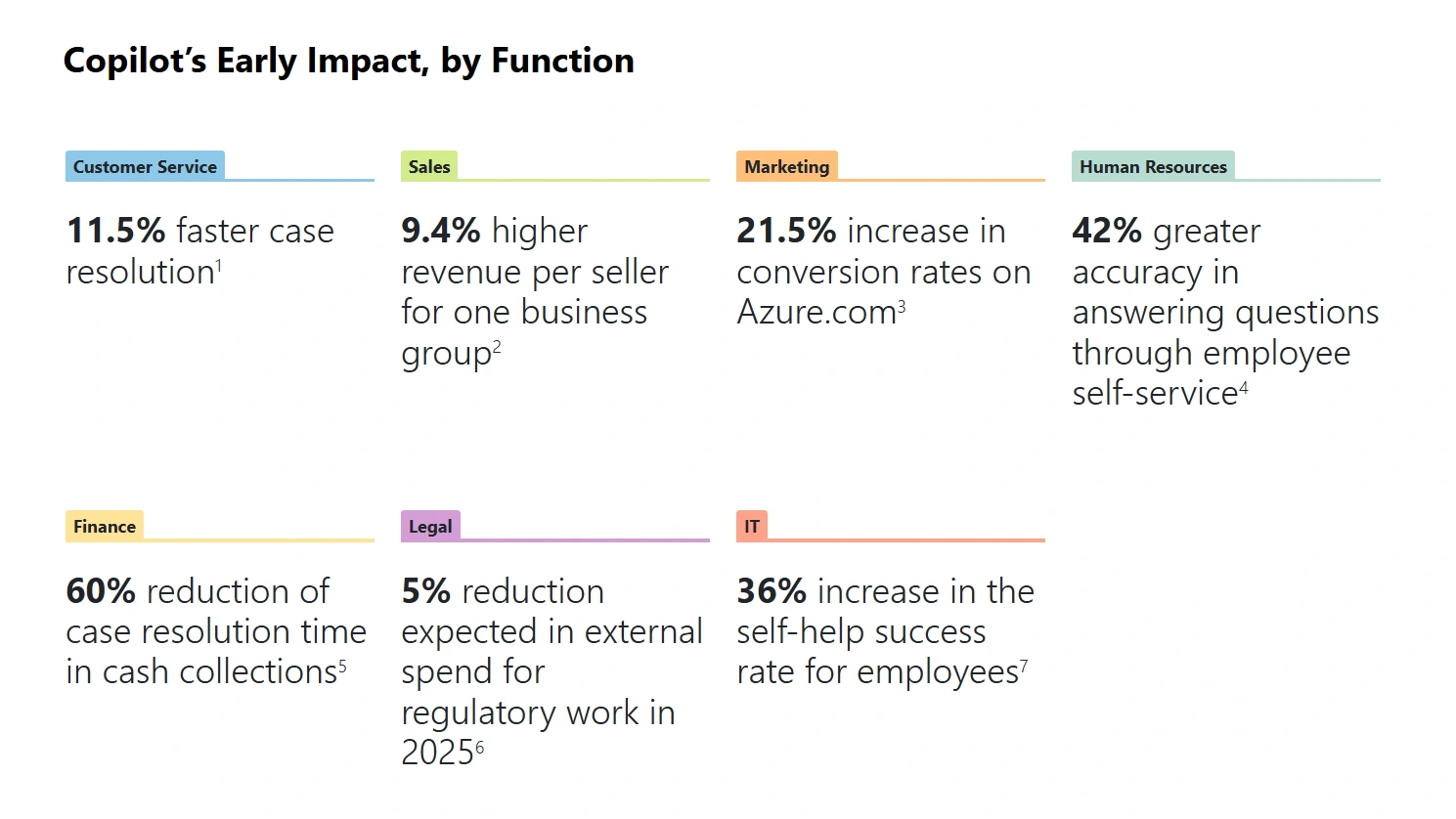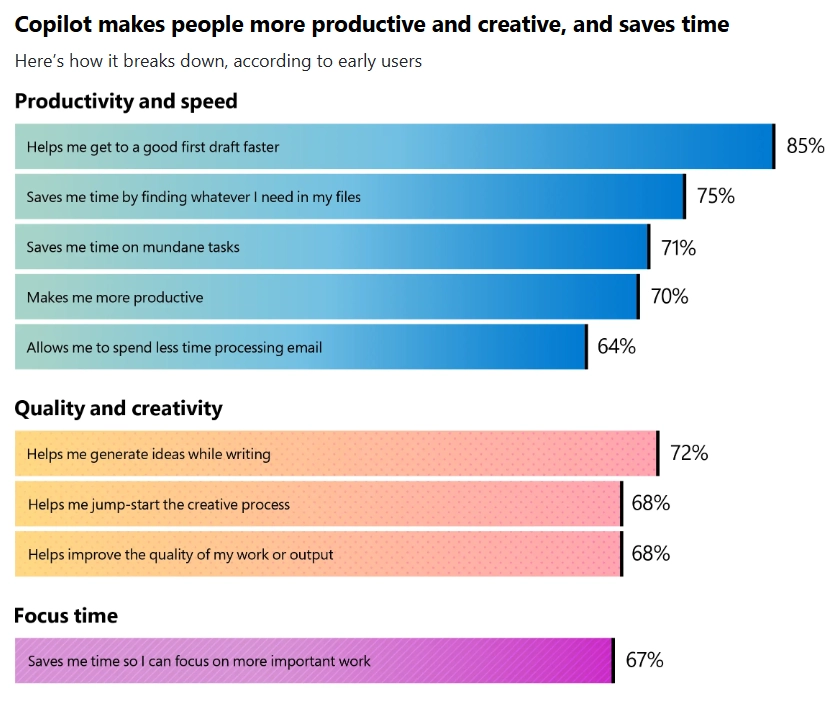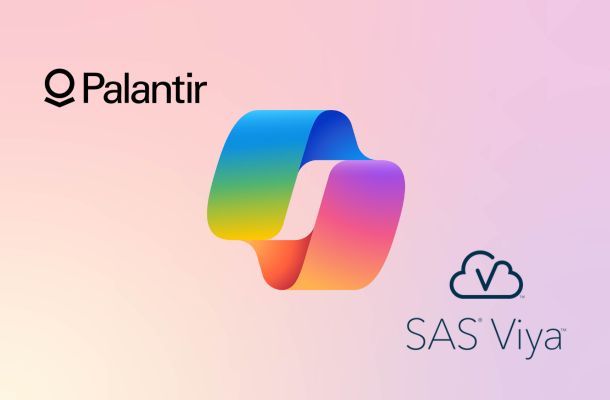The current global economic reality is characterized by immediate access to information, high volatility, an unpredictable business environment, a greater need for efficiency and innovation, as well as improved experiences for all stakeholders who influence the growth of a business.
Among the many available technologies, Microsoft Copilot is one of the most recommended tools for companies to successfully face all these challenges. Designed to be the best AI assistant for productivity, Copilot aims to optimize internal processes, centralize operations, improve decision-making capabilities and foster innovation.
In this article, we will see how Microsoft’s assistant can be the ally your company has been looking for to keep growing.
Copilot AI for business: an introduction
Artificial intelligence is adapting and innovating at every moment, revolutionizing both individual and collective work experiences. Companies that have already adopted this technology have improved their productivity and efficiency, becoming part of a collective change that is radically transforming the modern workplace.
In a recent webinar, Deb Cupp, one of Microsoft’s top managers, emphasized that organizations must be ready for AI. It is essential to already have the right applications and data in place in order to fully harness the value of this new technology. According to Cupp, Copilot should be considered a key element in strategic business planning.
To ensure success, companies must understand the potential of AI and develop an agile corporate culture that supports its integration. Effective AI governance is also crucial: having clear processes of accountability and control makes it possible to maximize the benefits while reducing risks.
Although many companies face challenges in integrating AI, such as outdated systems and a shortage of technical skills, training teams is fundamental for effective implementation.
Tools like Copilot can help organizations grasp the concrete value of AI. According to Microsoft, 70 percent of Copilot users report being more productive, and nearly 70 percent say that this tool is making a significant contribution to their work.
So, can Copilot also help your business? Let’s find out in the following sections.

What is Microsoft Copilot
Microsoft Copilot is an artificial intelligence–based assistant integrated into Microsoft 365 apps. Built on OpenAI’s GPT models, Copilot helps users automate tasks, generate insights, and improve workflows. It is not just a chatbot, but a powerful tool designed to integrate seamlessly with existing business processes.
By understanding the context from your data, Copilot can provide real-time suggestions, draft documents, analyze data, and even manage team communication. For companies, this means reducing manual work and dedicating more time to higher-value activities.
Copilot is not a single product but a family of solutions designed for different scenarios and types of users. Let’s explore some of the Copilot products created for business users and how they can transform operations with AI.
Copilot for M365
Copilot for Microsoft 365 was introduced to help business users improve productivity and creativity by leveraging the power of generative artificial intelligence. Integrated into Microsoft 365 (which includes Office, Outlook, OneDrive, SharePoint, and Teams), Copilot allows users to interact with data, documents, emails, and calendars using natural language, receiving AI assistance for tasks and projects.
For example, a business user can ask Copilot to summarize emails, retrieve recent communications, draft emails or documents, and search for answers across their data. In addition, Copilot for M365 helps create various types of content (reports, presentations, articles, blogs) by offering suggestions, templates, and examples based on context.

Copilot for Dynamics 365
Another Copilot product that can help business users transform their operations with AI is Copilot for Dynamics 365. Dynamics 365 is a suite of business applications that includes tools for sales, marketing, customer service, operations, finance, and human resources.
Copilot for Dynamics 365 is integrated with Dynamics 365, allowing business users to use natural language to interact with business data, processes, and workflows, receiving AI-based assistance for their decisions and actions.
With Copilot for Dynamics 365, business users can ask questions, gain insights, and perform actions across different Dynamics 365 applications using a single interface and a unified language.
Copilot can help business users to:
- Analyze sales data
- Optimize marketing campaigns
- Improve customer service
- Streamline operations
- Manage finances
- Engage employees
All while leveraging the power of artificial intelligence.

Copilot for Sales
Microsoft Copilot for Sales is an AI-based tool that helps companies improve their sales processes and outcomes. It is integrated with Microsoft Dynamics 365 and allows business users to use natural language to interact with sales data, processes, and workflows, receiving AI-based assistance for their decisions and actions.
The benefits of using Copilot for Sales are numerous, and it can help companies to:
- Analyze sales data
- Optimize sales campaigns
- Improve customer service
- Streamline sales operations
- Manage finances
Copilot for Sales can also help companies generate ideas and content more quickly, perform and automate tasks faster, gain insights, and define next steps. By harnessing the power of artificial intelligence, companies can increase their productivity, competitiveness, and customer satisfaction.
According to a Bain & Company report from August 2023 titled How Generative AI Will Supercharge Productivity, 29 percent of the activities carried out by sales teams can be automated using AI tools such as Copilot for Sales. In a similar McKinsey study from June 2023 titled The economic potential of generative AI: The next productivity frontier, it was found that sales expenses will decrease by 2 to 5 percent thanks to productivity gains directly derived from the use of AI.

Copilot for Finance
Microsoft Copilot for Finance is a tool designed to accelerate the time required to achieve measurable impact for finance professionals, uncovering insights that reduce the time these professionals spend on manual and repetitive activities.
These insights can include providing action-oriented recommendations, proactively detecting anomalies, and offering specialized suggestions that can be applied. Copilot for Finance can also improve efficiency by applying next-generation AI to time-consuming manual tasks such as managing accounts receivable collections and updating contracts.
Data from multiple financial systems can be analyzed to highlight recommendations, anomalies, risks, or orphaned data that require attention. These data can be processed and, if necessary, generate comments or reports to simplify variance analysis or month-end reporting. Copilot for Finance integrates directly with the Microsoft tools your finance teams use every day, such as Excel, PowerPoint, Outlook, and Teams.

Copilot AI for business: implementation advantages
The Copilot product family is certainly diverse (and the ones above are only a few examples), but some may still wonder what the concrete advantages are of implementing an AI assistant within their organization.
In this section, we will try to answer this question by exploring the main benefits that Copilot can bring to business operations.
Enhancing productivity
One of the main advantages companies can gain from Copilot for Microsoft 365, and perhaps the most important, is improving employee productivity. Microsoft Copilot for M365 integrates with Teams, Outlook, Word, PowerPoint, Excel, OneNote, and other Microsoft 365 applications, enhancing functionalities and assisting users in their tasks.
For example, in Microsoft Word, Copilot uses its Intelligent Assistance to correct grammatical and spelling errors, suggest synonyms, and even provide relevant content based on the topic at hand.
Similarly, in Excel, Copilot can generate complex formulas, create charts, and assist with data analysis. In PowerPoint, it can suggest slide layouts, design ideas, and help communicate a message effectively. In essence, Copilot can enhance productivity across all Microsoft 365 applications.
A special report published by Microsoft and included in its Work Trend Index provides clear numbers:
- 70% of users said Copilot AI made their work more productive
- 68% improved the quality of their work
- 64% reduced the time spent managing emails
- 75% spent less time searching for emails
- 29% completed tasks like text summarization or blog writing faster
- Advanced users saved more than 10 hours per month
Streamlining operations
In addition to improving employee productivity through Microsoft 365 applications, Copilot can also help streamline business operations by automating repetitive tasks, freeing up valuable time for more strategic work.
Moreover, Copilot leverages artificial intelligence to analyze business data, including sales, customer interactions, and operational metrics. It can use these data to provide valuable insights, helping business leaders make informed decisions about trends, demand forecasts, and areas for improvement.
This support enables organizations to optimize resource allocation, prioritize tasks, and adapt business operations according to needs, ensuring greater operational flexibility.
Reducing IT costs
Another key advantage that Copilot for Microsoft 365 offers companies is the reduction of IT costs.
IT teams can benefit from the automation of routine tasks such as software updates, security patches, and system maintenance. By automating these processes, companies can reduce the need for manual intervention, allowing IT teams to focus on more strategic activities.
In addition, Copilot uses AI to predict potential IT issues before they escalate. Identifying and resolving these problems in advance helps prevent costly downtime and emergency interventions that could require hours of work.
Through data analysis, Copilot can also optimize IT resource allocation, for example by reallocating licenses or adjusting server capacity based on demand. It can also provide insights on cloud usage and costs, identify unused resources, optimize configurations, and suggest more cost-effective cloud solutions.
Improving security
In addition to reducing IT costs, Microsoft Copilot 365 can help improve business security, especially when combined with Microsoft Security Copilot (available under a separate license from M365 Copilot).
Security Copilot integrates with Microsoft Defender, offering advanced protection against phishing, malware, and other cyber threats. It analyzes attachments, links, and emails to prevent harmful content from reaching the inbox.
It also supports access and identity management, ensuring secure access to corporate resources. It is compatible with Azure Active Directory for user authentication and authorization.
For secure communications, Security Copilot leverages data encryption both in transit and at rest. Communication between devices and servers is protected by TLS/SSL protocols, while files stored in OneDrive, SharePoint, and Teams are encrypted to prevent unauthorized access.
Finally, it also helps with regulatory compliance, supporting companies in meeting requirements such as GDPR, HIPAA, ISO 27001, and others by providing audit logs, security reports, and compliance assessments.
Operating within Microsoft’s secure ecosystem, Security Copilot adheres to enterprise-level standards of security, privacy, and compliance, ensuring the protection of sensitive information.
Facilitating creativity and collaboration
Companies can also benefit from the creativity and collaboration that Copilot for Microsoft 365 helps facilitate.
One way Copilot supports the creative process is by retrieving answers and inspiration from the web on behalf of the user. Whether it is researching a topic, finding creative ideas, or seeking solutions, Copilot provides real-time assistance.
Similarly, Copilot can support creative work by suggesting relevant content and alternative approaches, helping to drive momentum in the creative process.
Beyond supporting creativity, Copilot facilitates collaboration with AI-powered chat features such as drafting emails, creating documents, generating meeting notes, and optimizing communication among team members.
In collaborative documents, Copilot helps maintain consistent language, formatting, and terminology, thereby improving the overall quality of teamwork.

Copilot AI for business: features and functionalities
Copilot offers standout functionalities for businesses, such as automatic report generation, meeting note summaries, drafting emails, and creating presentations using existing documents and information.
Among the main features, we can mention:
- Productivity tools: Within Office applications such as Word, Excel, and PowerPoint, Copilot automates document formatting, suggests content improvements, and generates data insights. For example, in Word, Copilot can help write drafts, correct text, and format documents according to user preferences and industry standards.
- Data analysis: In Excel, Copilot automates data cleaning, performs complex calculations, and visualizes trends through advanced charting functionalities, making data analysis easier and allowing users to quickly gain valuable insights from large datasets.
- Collaboration and communication: Integrated into Microsoft Teams, Copilot facilitates collaboration by automating meeting scheduling, summarizing discussions, and organizing team tasks, improving group productivity and communication in distributed teams.
- Workflow automation: With tools such as Power Automate (available under a separate license) or the new Copilot Actions included in Microsoft 365 Copilot, it is possible to create flows that automate repetitive tasks across applications and third-party services, reducing manual work, minimizing errors, and speeding up task completion.
- Agents and Copilot Studio: Need a more personal approach to AI assistance? With Copilot Studio, it is possible to create customized Agents trained on your own data that can support you with highly specific tasks. No more generic responses now that you can shape your AI assistant as you wish.
Copilot use cases in business
Everything sounds great so far, but some may wonder how Copilot performs in a real-world scenario, and that is a legitimate question.
Let’s answer it with a few examples, showing in specific situations how Microsoft’s “copilot” can make a difference.
Automation of purchasing processes
A mid-sized manufacturing company manages a high volume of purchase orders (POs) every month. Traditionally, the PO approval process required manual reviews and approvals by multiple managers, causing delays and potential errors.
Copilot can assist in generating POs by analyzing purchase requests, supplier catalogs, and historical data. It automatically fills in relevant information such as supplier details, item descriptions, quantities, and prices, based on predefined templates and past records.
Once a PO is created, the “copilot” can automatically route it to the appropriate managers according to predefined rules (for example, amount thresholds, department, or item category). It also sends notifications to approvers, providing all the details and context needed for a quick review.
The AI assistant’s features can also provide purchasing insights, such as supplier performance, price trends, and budget impact. It can suggest alternatives, flag discrepancies based on historical data, and set up control thresholds.
Once approved, Copilot can automate the next steps, such as sending the PO to the supplier, updating inventory records, and notifying relevant departments. It also maintains an automated audit trail of the approval process to ensure compliance and record-keeping.
Enhanced sales analysis
A data analyst in a retail company is tasked with analyzing sales data to identify trends, forecast future sales, and generate useful insights for the sales team.
Microsoft Copilot’s features integrate data from various sources within Business Central, such as sales orders, customer information, inventory levels, and financial data, which it then aggregates and cleans automatically, ensuring the analyst has a complete and accurate dataset.
Copilot generates visualizations such as charts, diagrams, and dashboards to illustrate sales trends, seasonal patterns, and performance metrics. It highlights significant trends and anomalies, such as the increase in sales of a specific product or the decline in customer engagement.
Using historical sales data, the AI assistant can leverage machine learning algorithms to predict future sales and demand trends. The analyst can model different scenarios based on factors like promotional campaigns or market changes.
Microsoft Copilot’s features then provide actionable recommendations based on the analysis, such as optimal inventory levels, potential expansion areas, or strategies to improve sales performance. It can alert the analyst to potential issues, such as declining sales in a key market or inventory shortages.
In addition, it can generate detailed reports that summarize the analysis, including key findings, trends, and recommendations. The analyst can customize these reports to meet the needs of different stakeholders, such as the sales team, management, or external partners.

Managing a product launch
A project manager in a technology company is overseeing the launch of a new product. The project requires coordinating activities across multiple teams, monitoring progress, and ensuring on-time delivery within budget.
Copilot can assist in creating a detailed project plan by breaking the project into tasks and milestones, using historical data and best practices to suggest task dependencies and timelines. It can also help allocate resources by analyzing team availability, skills, and workload. Copilot can recommend the optimal distribution of tasks among team members.
Microsoft Copilot’s features then provide real-time updates on project progress, including task completion status, budget spending, and adherence to deadlines. The AI assistant can send alerts for any deviations from the plan, such as delays in completing tasks or budget overruns, allowing the project manager to take timely corrective action.
The “copilot” can also analyze project performance metrics and generate insights on aspects such as team productivity, task efficiency, and budget utilization. Based on these metrics, it can provide recommendations to optimize project execution, such as reallocating resources, adjusting timelines, or addressing potential risks.
Finally, it can greatly facilitate communication among team members by integrating with collaboration tools like Teams and providing updates on task status and project milestones, as well as helping to manage and organize related documentation.
Managing a marketing campaign
A creative designer at a marketing agency is tasked with designing and managing a marketing campaign for the launch of a new product. The campaign includes creating promotional materials, coordinating with the marketing team, and monitoring campaign performance.
Copilot can help analyze the campaign brief and objectives, extracting key requirements and goals for the design work. It can suggest initial design concepts and ideas based on past campaigns, industry trends, and client preferences.
It can also assist in organizing and managing design resources such as images, logos, and templates, ensuring that all assets are up to date and easily accessible.
If one gets lost among the countless project iterations, Copilot keeps track of design file versions, monitoring changes and ensuring that the most recent versions are used in the campaign.
If instead there are difficulties in setting a roadmap, Copilot can help create and manage a timeline for design activities, including deadlines for drafts, reviews, and final approvals.
Conclusions
If ChatGPT paved the way for the widespread use of AI technologies by the general public, Microsoft Copilot has been the product that showcased their potential in the field of business productivity.
Voted as one of the best productivity tools of recent years, the AI digital assistant from the Redmond giant can truly make a difference for businesses, and the future looks promising for Microsoft’s AI.
If you are unsure where to start, Copilot Circle experts can guide you in beginning your journey into the world of AI today, following you step by step in designing implementation strategies and learning how to use it.
So why wait?
FAQ on Copilot AI for business
What is Microsoft Copilot for business?
Microsoft Copilot is an artificial intelligence assistant built on OpenAI’s GPT models. It is integrated into Microsoft 365 applications and designed to automate tasks, generate insights, draft documents, analyze data, and improve business workflows, going beyond the role of a chatbot to become a true productivity tool.
What versions of Copilot are available for businesses?
There are several Copilot versions tailored to different needs. Copilot for M365 works within Word, Excel, PowerPoint, Outlook, Teams, OneDrive, and SharePoint, enabling users to manage emails, documents, presentations, and analyses through natural language. Copilot for Dynamics 365 supports areas such as sales, marketing, customer service, operations, finance, and HR by offering insights and process automation. Copilot for Sales is designed for sales teams, helping with data analysis, campaign optimization, and content generation. Finally, Copilot for Finance assists finance professionals by reducing manual tasks and providing intelligent recommendations integrated with Excel, Outlook, PowerPoint, and Teams.
What benefits does Copilot bring to companies that implement it?
Copilot boosts productivity and work quality, reduces the time needed for emails and searches, streamlines operations by automating repetitive tasks and providing actionable insights, lowers IT costs by automating maintenance and predicting issues, enhances security when paired with Security Copilot, and stimulates creativity and collaboration by offering intelligent suggestions and consistency in shared content.
What key features does Copilot offer?
Copilot can generate reports, emails, presentations, and summaries of texts or meetings. In Word it assists with writing and editing, in Excel it supports data analysis with complex formulas and advanced charts, in PowerPoint it suggests layouts and design ideas, and in Teams it helps organize meetings and tasks. It can also automate workflows via Power Automate or Copilot Action, and with Copilot Studio, companies can create custom agents trained on their own data.
How does Copilot support real business processes?
Copilot has concrete applications in real-world scenarios. In purchasing, it can generate orders, fill in data automatically, and route approvals with traceability. In sales analysis, it aggregates and cleans data, creates dashboards, predicts demand, and suggests strategies. In project management, it helps plan tasks and milestones, monitors budgets, and alerts managers about deviations. In marketing campaigns, it interprets briefs, suggests concepts, manages resources, and controls file versions. In all cases, it reduces time and errors while offering data-driven recommendations.
Can Copilot really make a difference for companies?
Yes. Copilot is recognized as one of the most impactful productivity tools in recent years. Its ability to improve efficiency, work quality, and innovation makes it a strategic ally for business growth and for facing today’s complex and dynamic markets.
How can a company start implementing Copilot?
Successful adoption requires building an agile organizational culture, promoting team training, and preparing proper infrastructures and data. A clear governance model with defined responsibilities and controls is equally important. A gradual approach with pilot projects and user involvement eases integration and maximizes results. In this journey, the Copilot Circle team can support any company with dedicated guidance and consultancy.





